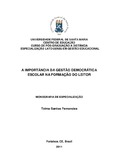| dc.contributor.advisor | Mousquer, Maria Elizabete Londero | |
| dc.creator | Fernandes, Telma Santos | |
| dc.date.accessioned | 2019-04-04T12:16:03Z | |
| dc.date.available | 2019-04-04T12:16:03Z | |
| dc.date.issued | 2011-09-16 | |
| dc.date.submitted | 2011 | |
| dc.identifier.uri | http://repositorio.ufsm.br/handle/1/16065 | |
| dc.description | Monografia (especialização) - Universidade Federal de Santa Maria, Centro de Educação, Curso de Especialização em Gestão Educacional, EaD, RS, 2011. | por |
| dc.description.abstract | The importance of democratic participative school management in formation of
readers of the elementary education was the central axis of this bibliographic
research. In order to identify and recognize the conception of many authors who
focus on this subject, we attempt to understand the principles that guide the
democratic management, which are the School Council, the Pedagogical Political
Project, election of directors and financial decentralization, and then identify how they
can positively interfere in the pursuit of reproduce in schools children and young
readers in their widest sense. That they are not only able to decipher the code
written, but they can understand, reflect, interpret, criticize, read between the lines
and develop a taste for reading. As well as pave the way for changing attitudes and
values, promoting advances in their personal, professional and school life. It was in
this sense that the survey was conducted, trying to understand why the current
school is not satisfying these needs, whether it's one of its fundamental principles,
and how the democratic management can promote significant advances in the
formation of the reader, once committed to its guiding principles. We realize that the
direct intervention of management with teachers, promoting studies, planning and a
continuous training, also in order to develop a taste for reading in the teachers, would
be one of the crucial points, as these are the ones that have more contact with
students and can lead to real change. Also take parents to school, making them
realize the role of adults on the formation of reading in children. And lastly, we have
seen as the work of the school library can play an indispensable role, with the
support of school management, with literature for children and youth to develop a
taste for reading and allow the formation for citizenship. | eng |
| dc.language | por | por |
| dc.publisher | Universidade Federal de Santa Maria | por |
| dc.rights | Acesso Aberto | por |
| dc.rights | Attribution-NonCommercial-NoDerivatives 4.0 International | * |
| dc.rights.uri | http://creativecommons.org/licenses/by-nc-nd/4.0/ | * |
| dc.subject | Gestão escolar | por |
| dc.subject | Democracia | por |
| dc.subject | Leitor | por |
| dc.subject | School management | eng |
| dc.subject | Democracy | eng |
| dc.subject | Reader | eng |
| dc.title | A importância da gestão democrática escolar na formação do leitor | por |
| dc.title.alternative | Importance of democratic school management in readers formation | eng |
| dc.type | Trabalho de Conclusão de Curso de Especialização | por |
| dc.degree.local | Polo de Fortaleza, CE, Brasil | por |
| dc.degree.specialization | Gestão Educacional, EaD | por |
| dc.description.resumo | A importância da gestão escolar democrática participativa na formação do leitor da
educação básica constituiu o eixo central dessa pesquisa bibliográfica. A fim de
identificar e reconhecer a concepção de diversos autores que se debruçam sobre
esse tema, buscamos compreender os princípios que norteiam a gestão
democrática, que são o Conselho Escolar, o Projeto Político Pedagógico, eleição
para diretores e a descentralização financeira, para então identificar como eles
poderão interferir positivamente na busca de reproduzir nas escolas, crianças e
jovens leitores em seu sentido mais amplo. Que não sejam capazes apenas de
decifrar o código da escrita, e sim, que possam compreender, refletir, interpretar,
criticar, ler as entrelinhas e desenvolver o gosto pela leitura. Bem como abrir
caminho para mudanças de atitudes, de valores, promovendo avanços na vida
escolar, pessoal e profissional. Foi nesse sentido que a pesquisa se enveredou,
buscando entender porque a escola atual não vem satisfazendo essas
necessidades, se essa é um dos seus princípios fundamentais, e como a gestão
democrática pode promover avanços significativos na formação do leitor, uma vez
comprometida com seus princípios norteadores. Constatamos que a intervenção
direta da gestão com os professores, promovendo estudos, planejamentos e uma
formação contínua, visando desenvolver também no professor o gosto pela leitura,
seria um dos pontos cruciais, pois estes são os que mais têm contato com os
estudantes e que podem provocar a verdadeira mudança. Levar também os pais
para a escola, fazendo-os perceber o papel do adulto na formação da leitura nas
crianças. E vimos por último, como o trabalho da biblioteca escolar pode contribuir
de forma indispensável, com o apoio da gestão escolar, com a literatura infantojuvenil
para desenvolver o gosto pela leitura e possibilitar a formação para a
cidadania. | por |
| dc.publisher.country | Brasil | por |
| dc.publisher.initials | UFSM | por |
| dc.subject.cnpq | CNPQ::CIENCIAS HUMANAS::EDUCACAO | por |
| dc.publisher.unidade | Centro de Educação | por |



